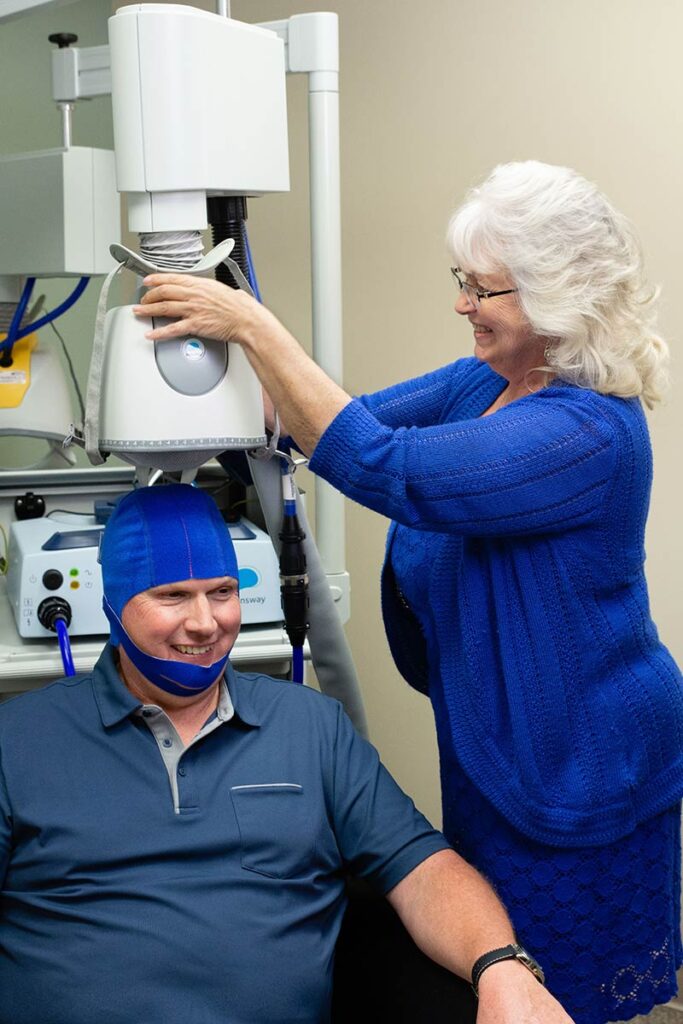After a typical course of 36 treatments, some patients will have remission of their depression for a year or more. More typically, however, patients often will obtain remission of their depressive symptoms for 3-12 months. Patients can return any time for another course of treatment.

Find out if TMS therapy is right for you. Take the self assessment.
We'll work with you to decide if Deep TMS is the right options for you.
After treatments, most patients see significant improvements in depression.
Patients can return any time for additional treatments.
"When I get a particularly depressive thought now, I can choose not to dwell on it - or it is just easier to look at it in a different way that isn't so depressing, and that helps!"
Deep TMS Patient
“I'm finding I've been more focused with less procrastination.”
Deep TMS Patient
“In therapy, I have been able to go places I haven't been able to before"”
Deep TMS Patient
Have questions about Transcranial Magnetic Stimulation? Learn more today or visit our Deep TMS page to see all the details.
TMS stands for Transcranial Magnetic Stimulation. Transcranial means the stimulus passes through the skull or cranium. The stimulus is caused by a changing magnetic field, like in an MRI machine, which creates electrical stimulation in cells inside the brain. Magnetic stimulation non-invasively stimulates the brain without causing pain in the way direct stimulation would.
Stimulation of the brain causes neurons to release of neurotransmitters and increases BDNF (brain-derived neurotrophic factor). BDNF promotes the growth and survival of nerve cells in the brain.
You’ll arrive at the office and fill out a daily habit questionnaire. Weekly you’ll fill out a depression assessment called a PHQ-9.
You’ll sit down in a comfortable chair and place earplugs in your ears.
A targeting cap is placed over your hair, which helps us systematically find the appropriate treatment area and treatment stimulus strength.
Treatment consists of 1980 pulses given in groups of 36 pulses. Each pulse is 2 seconds with a wait time between groups of pulses of 20 seconds. The total treatment time in the chair is only about 20 min. During treatment, you can relax, read, or watch TV.
Patients describe the sensation of treatment in a variety of ways. Initially, patients describe the sensation as unusual (though not painful) over the first few treatments as they get used to the feeling. The helmet can be adjusted slightly for improved comfort if needed. Patients quickly acclimate to the sensation.
A typical treatment course is five days a week for six weeks, then a taper schedule of 6 more sessions over the subsequent three weeks for a total number of treatments of 36.
The most common side effect is headache on the day of treatment. In studies, this ranged from 5-25% of patients receiving TMS treatment. Typically, the headache is mild and easily treated with over the counter pain relievers.
Neck pain can also occur, especially after the first session, when we must repeatedly adjust the helmet to find the proper treatment position.
Other side effects include temporary and mild discomfort at the treatment site (in studies, this occurred 20-40%). Jaw and tooth pain can occur, which is easily prevented or alleviated by purchasing and wearing an over the counter mouth guard during treatment. There can be a rare increase in tinnitus or mild decreased ability to hear, but these risks are minimized by wearing earplugs during treatment which is mandatory.
Lastly, there is a risk of seizure, which is less than 0.1%. We evaluate patients before each session to ensure nothing might contribute to this happening, such as excessive alcohol, caffeine, lack of sleep, or drugs that could lower the seizure threshold.
The majority of insurance companies cover TMS. A prior authorization is required. Co-pays are typically still necessary. Most insurance companies want to see the following before they approve a course of TMS;
If you choose to pay out of pocket, we offer a discounted fee. Please call for details. We accept credit cards and will charge your credit card weekly. If you do not complete the entire TMS course for whatever reason, there is no charge for treatments you do not receive.
Catalyst Psychiatry empowers change within by looking at all aspects of you and your unique situation. Our services include Counseling, Deep TMS, Medication Management, Psychiatric Diagnosis & Treatment, Psychotherapy, and Genesight in Corvallis, Oregon.